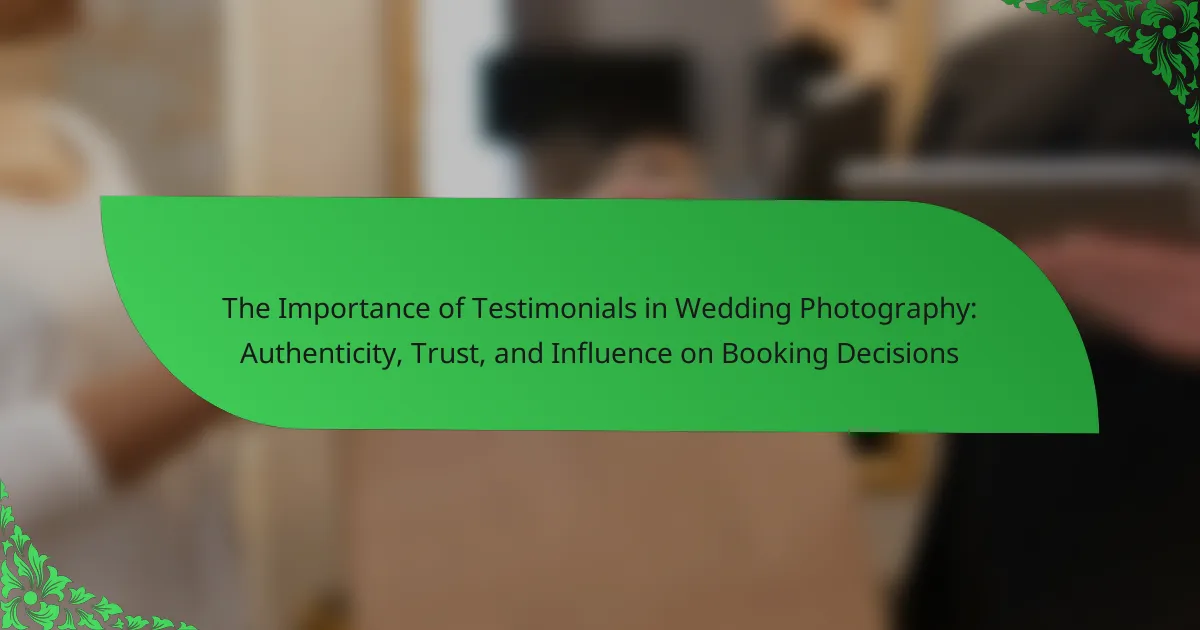Client testimonials play a crucial role in shaping the reputation and marketing strategies of wedding photography brands. Positive feedback from clients serves as social proof, enhancing credibility and influencing potential customers’ trust in a photographer’s services. Research indicates that a significant percentage of consumers value online reviews similarly to personal recommendations, which can lead to increased bookings and referrals. Additionally, testimonials help differentiate brands in a competitive market by highlighting unique attributes and fostering emotional connections with the audience. Overall, leveraging client testimonials is essential for building customer loyalty and driving business success in the wedding photography industry.

How do client testimonials influence wedding photography brands?
Client testimonials significantly influence wedding photography brands by enhancing their credibility and reputation. Positive testimonials serve as social proof, reassuring potential clients of the quality and reliability of a photographer’s services. Research indicates that 79% of consumers trust online reviews as much as personal recommendations. This trust can lead to increased bookings and referrals for photographers. Furthermore, testimonials highlight unique attributes of a brand, helping differentiate it in a competitive market. Brands that actively showcase client feedback tend to build stronger emotional connections with their audience. This connection can result in higher customer loyalty and repeat business. Overall, client testimonials are a powerful marketing tool that shapes the perception and success of wedding photography brands.
What role do client testimonials play in shaping brand reputation?
Client testimonials significantly influence brand reputation. They provide social proof that enhances credibility. Positive testimonials can attract new clients by showcasing successful experiences. According to a study by BrightLocal, 79% of consumers trust online reviews as much as personal recommendations. This trust translates into higher conversion rates for brands. Additionally, testimonials can highlight unique attributes of a brand, differentiating it from competitors. Brands with numerous positive testimonials are perceived as more reliable and trustworthy. This perception can lead to increased customer loyalty and repeat business. Overall, client testimonials serve as a vital component in building and maintaining a strong brand reputation.
How do positive testimonials enhance credibility for wedding photographers?
Positive testimonials enhance credibility for wedding photographers by providing social proof of their skills and reliability. When potential clients read positive reviews, they perceive the photographer as trustworthy. This perception is crucial in a market where emotions and memories are at stake. Testimonials serve as endorsements from previous clients, validating the photographer’s quality of work. Research shows that 88% of consumers trust online reviews as much as personal recommendations. This statistic underscores the power of testimonials in influencing decision-making. Furthermore, positive testimonials can differentiate photographers in a competitive market. They highlight unique qualities and experiences that may resonate with prospective clients. Overall, testimonials build a photographer’s reputation and encourage bookings by establishing credibility.
What impact do negative testimonials have on brand perception?
Negative testimonials significantly harm brand perception. They create doubt and distrust among potential customers. Research indicates that 86% of consumers read reviews before making a purchase. Negative reviews can lead to a decrease in sales and customer loyalty. Brands may experience a tarnished reputation, which can take years to rebuild. A study from Harvard Business School found that a one-star increase in ratings can lead to a 5-9% increase in sales. Thus, negative testimonials can have a profound and lasting impact on how a brand is viewed in the marketplace.
How can testimonials differentiate wedding photography brands in a competitive market?
Testimonials can significantly differentiate wedding photography brands in a competitive market. They provide social proof that builds trust with potential clients. Positive testimonials highlight the unique experiences and satisfaction of previous customers. This differentiation is crucial as couples often rely on peer recommendations when choosing a photographer. Brands with numerous testimonials can showcase their strengths, such as creativity or reliability. Research shows that 79% of consumers trust online reviews as much as personal recommendations. Therefore, effective use of testimonials can lead to increased bookings and brand loyalty.
What unique attributes of a brand can be highlighted through testimonials?
Unique attributes of a brand that can be highlighted through testimonials include quality of service, customer satisfaction, and emotional connection. Testimonials often emphasize the exceptional quality of a photographer’s work. Clients frequently mention how their photos captured special moments beautifully. Customer satisfaction is another key attribute, as testimonials reflect positive experiences with the photographer. Many clients express how the photographer was professional and easy to work with. Emotional connection is also significant; testimonials often reveal how clients felt during their wedding day. This emotional resonance can be a powerful differentiator in a competitive market. Additionally, testimonials can highlight unique styles or specialties, such as candid photography or artistic editing. These attributes collectively enhance the brand’s reputation and appeal to potential clients.
How do testimonials showcase a photographer’s style and approach?
Testimonials showcase a photographer’s style and approach by providing firsthand accounts of clients’ experiences. They highlight specific attributes of the photographer’s work, such as creativity and technical skills. Clients often describe the emotions evoked by the photographs, reflecting the photographer’s unique vision. Additionally, testimonials frequently mention the photographer’s professionalism and communication style. This information helps potential clients understand what to expect. By sharing personal stories, testimonials create a narrative that aligns with the photographer’s brand identity. They serve as social proof, reinforcing the photographer’s reputation in the market. Ultimately, testimonials help differentiate a photographer from competitors by emphasizing their distinctive approach.
What marketing strategies can leverage client testimonials effectively?
Utilizing client testimonials effectively can enhance marketing strategies significantly. First, showcasing testimonials on websites builds trust and credibility. Approximately 79% of consumers trust online reviews as much as personal recommendations. Social media platforms can amplify testimonials through shareable content. Engaging visuals paired with quotes can attract more attention. Video testimonials can create emotional connections, increasing engagement rates. Incorporating testimonials in email marketing can enhance open and click-through rates. Highlighting specific results or experiences in testimonials can demonstrate value effectively. Lastly, featuring testimonials in promotional materials can differentiate a brand in a competitive market.
How can testimonials be integrated into social media marketing?
Testimonials can be integrated into social media marketing by sharing them as posts, stories, or highlights. These formats allow brands to showcase real client experiences. Visual content, such as images or videos of satisfied clients, can enhance engagement. Quotes from testimonials can be designed as eye-catching graphics. Hashtags related to the brand can help increase visibility. Engaging with clients who provide testimonials can foster community. Regularly updating testimonials keeps content fresh and relevant. According to a study by BrightLocal, 79% of consumers trust online reviews as much as personal recommendations. This statistic underscores the effectiveness of using testimonials in social media marketing.
What are the best practices for showcasing testimonials on a website?
The best practices for showcasing testimonials on a website include placing them prominently on the homepage. Testimonials should be visually distinct to capture attention. Use high-quality images of clients alongside their testimonials for authenticity. Incorporate specific details about the service provided to enhance credibility. Ensure that testimonials are updated regularly to reflect current client experiences. Utilize a mix of text and video testimonials to cater to different preferences. Highlight testimonials that mention unique aspects of the service to differentiate the brand. Finally, include a call-to-action alongside testimonials to encourage potential clients to engage further.
What specific types of testimonials resonate most with potential clients?
Testimonials that include personal stories resonate most with potential clients. These narratives create emotional connections. Clients appreciate testimonials that highlight specific experiences. For example, reviews detailing memorable moments can be very impactful. Testimonials that mention the photographer’s professionalism also attract attention. Clients value reliability and quality service. Additionally, testimonials with before-and-after comparisons showcase tangible results. Statistics indicate that 79% of consumers trust online reviews as much as personal recommendations. This data underscores the importance of authentic testimonials in influencing client decisions.
How do storytelling testimonials differ from standard reviews?
Storytelling testimonials differ from standard reviews in their narrative approach. Storytelling testimonials focus on personal experiences and emotions. They engage the audience by weaving a narrative around the service or product. Standard reviews typically provide factual feedback and ratings. They often lack the emotional depth found in storytelling testimonials. Research shows that narratives can enhance memory retention by 65%. This indicates storytelling’s effectiveness in creating a lasting impression. Therefore, storytelling testimonials can foster stronger connections with potential clients.
What formats of testimonials are most impactful (video, written, etc.)?
Video testimonials are generally considered more impactful than written testimonials. They provide a personal touch and convey emotion effectively. Viewers can see [censured] expressions and hear tone of voice. This creates a stronger connection with the audience. According to a study by Wyzowl, 79% of consumers prefer to watch a video than read text. Written testimonials still hold value, especially for detailed feedback. They allow for easy scanning and can be referenced quickly. However, the emotional engagement of video often leads to higher conversion rates. Overall, video testimonials tend to resonate more deeply with potential clients.
How can wedding photographers encourage clients to provide testimonials?
Wedding photographers can encourage clients to provide testimonials by making the process easy and engaging. First, they should ask for feedback shortly after the event. This timing captures the clients’ fresh emotions and experiences. Second, photographers can provide a simple template or guide to help clients articulate their thoughts. This reduces the effort required from clients and increases the likelihood of a response.
Additionally, offering incentives, such as discounts on future services or prints, can motivate clients to share their testimonials. Photographers should also showcase existing testimonials prominently on their website and social media. This demonstrates the value of client feedback and encourages others to contribute.
Finally, maintaining a strong relationship with clients can foster goodwill. Satisfied clients are more likely to leave positive testimonials. According to a study by BrightLocal, 79% of consumers trust online reviews as much as personal recommendations, underscoring the importance of client testimonials in building a photographer’s reputation.
What techniques can be used to solicit genuine feedback from clients?
To solicit genuine feedback from clients, utilize structured surveys, personal interviews, and follow-up emails. Structured surveys allow clients to provide specific feedback on various aspects of the service. Personal interviews can foster open dialogue, encouraging more detailed responses. Follow-up emails serve as reminders and provide clients with an opportunity to reflect on their experience. Additionally, offering incentives can motivate clients to share honest feedback. Research shows that 70% of clients are more likely to provide feedback when they feel valued.
How can follow-up communication enhance the likelihood of receiving testimonials?
Follow-up communication significantly enhances the likelihood of receiving testimonials. It reminds clients of their positive experiences. This reminder can prompt clients to share their thoughts. Personalized follow-ups show clients that their feedback is valued. Clients are more likely to respond when they feel appreciated. Timely communication can also capture fresh memories of the service. Research shows that 70% of customers are willing to provide feedback when asked. This highlights the importance of proactive engagement. Consistent follow-up can lead to a higher response rate for testimonials.
What common mistakes should photographers avoid when using testimonials?
Photographers should avoid several common mistakes when using testimonials. One mistake is using vague or generic testimonials. Specificity enhances credibility and relevance. Another mistake is not showcasing diverse testimonials. Different perspectives appeal to a broader audience. Photographers also often neglect to update testimonials regularly. Fresh testimonials reflect current skills and services. Additionally, using unverified testimonials can damage credibility. Authenticity is crucial for building trust. Lastly, failing to ask for permission can lead to legal issues. Always obtain consent before publishing client feedback. These practices ensure testimonials effectively enhance a photographer’s brand.
How can misrepresenting testimonials damage a brand’s reputation?
Misrepresenting testimonials can severely damage a brand’s reputation. It undermines consumer trust when clients discover the truth. Trust is essential in the wedding photography industry, where emotional investment is high. According to a 2021 survey by BrightLocal, 79% of consumers trust online reviews as much as personal recommendations. Misrepresentation can lead to negative reviews and social media backlash. This can result in lost clients and reduced revenue. Furthermore, it may attract legal issues if clients feel deceived. Ultimately, integrity in testimonials is crucial for maintaining a positive brand image.
What practices ensure authenticity and credibility in testimonial use?
Authenticity and credibility in testimonial use can be ensured through several practices. First, use real clients who can verify their experiences. This adds trustworthiness to the testimonials. Second, include specific details about the services provided. Specificity can enhance the credibility of the testimonial. Third, obtain consent from clients before using their testimonials. This practice respects client privacy and fosters trust. Fourth, showcase diverse testimonials that reflect a range of experiences. This variety can appeal to different potential clients. Fifth, regularly update testimonials to reflect recent experiences. Current testimonials can demonstrate ongoing satisfaction. Lastly, incorporate visual elements, such as photos of the clients with their testimonials. Visuals can enhance authenticity and engagement.
What are the best ways to utilize testimonials for continuous brand improvement?
The best ways to utilize testimonials for continuous brand improvement include actively collecting feedback, showcasing positive reviews, and analyzing customer sentiments. Actively collecting feedback can be done through surveys and follow-up emails. Showcasing positive reviews on websites and social media increases brand visibility. Analyzing customer sentiments helps identify areas for improvement. Brands that effectively use testimonials can enhance customer trust. According to a study by BrightLocal, 91% of consumers read online reviews regularly. This statistic highlights the importance of displaying testimonials prominently. Consistent engagement with client testimonials fosters brand loyalty and encourages referrals.
The main entity of the article is client testimonials in the context of wedding photography brands. The article examines how these testimonials influence brand reputation, enhance credibility, and differentiate photographers in a competitive market. It highlights the importance of positive testimonials as social proof, the impact of negative reviews on brand perception, and effective marketing strategies for leveraging client feedback. Additionally, it discusses best practices for soliciting authentic testimonials and the significance of storytelling in client reviews, ultimately emphasizing the role of testimonials in fostering customer loyalty and driving business success.



